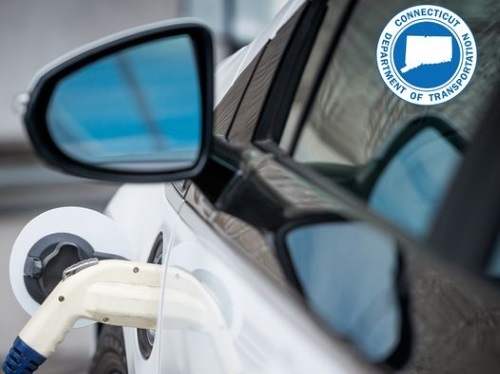The Connecticut Department of Transportation recently made universal Level 3 “fast chargers” that can fully recharge an electric vehicle or EV in less than 30 minutes available at the I-95 Southbound service plaza in Madison, CT.
[Above photo by the Connecticut DOT]
The agency said this is the first set of universal access fast chargers at a Connecticut service plaza, with additional publicly available fast chargers at service plazas in New Canaan, Greenwich, and Fairfield expected to become available over the next several weeks.
Tesla-specific chargers are already in place at many Connecticut service plazas, operated by Project Service LLC, but these new Level 3 fast chargers are universal, meaning any EV can plug in and charge up.
Applegreen Electric, a private organization with over 500 fast EV charging bays across the globe, funded their installation, Connecticut DOT noted. They are available on a first-come, first-served basis, and require a credit card for payment.
“These universal fast chargers make it easier for people to travel to and through Connecticut. With convenient access to I-95 and I-395, families and travelers can grab a coffee or snack, charge up, and get back on the road more quickly and enjoy their summer plans,” Connecticut DOT Commissioner Joe Giulietti explained in a statement.
“The future of transportation is green transportation, and by providing these chargers at our clean and convenient service plazas, we are making sure Connecticut is EV ready,” he said.
“Scaling up EV deployment across our state is a major component of our strategy to achieve our Greenhouse Gas Emissions goals and mitigate the climate crisis before it’s too late,” added Katie Dykes, commissioner of the Connecticut Department of Energy and Environmental Protection.
“The transportation sector is responsible for the majority of our greenhouse gas emissions (38 percent) and 66 percent of nitrogen oxide emissions, a significant contributor to harmful air pollution in our state,” she noted. “A key aspect of consumer adoption of EVs will be ease of use, ability to access charging infrastructure conveniently, and ability to charge quickly.”
The American Association of State Highway and Transportation Officials, the National Association of State Energy Officials, the U.S. Department of Transportation, and the U.S. Department of Energy signed a memorandum of understanding on February 23 to coordinate nationwide investment in EV charging station infrastructure.
Jim Tymon, AASHTO’s executive director, explained in a statement that the MOU provides a “framework for collaboration” in response to the $5 billion National Electric Vehicle Infrastructure Formula Program established by USDOT and DOE on February 10 to build and operate a nationwide network of EV charging stations.
Funding for that new program comes from the $1.2 Trillion Infrastructure Investment and Jobs Act or IIJA signed into law in November 2021.

